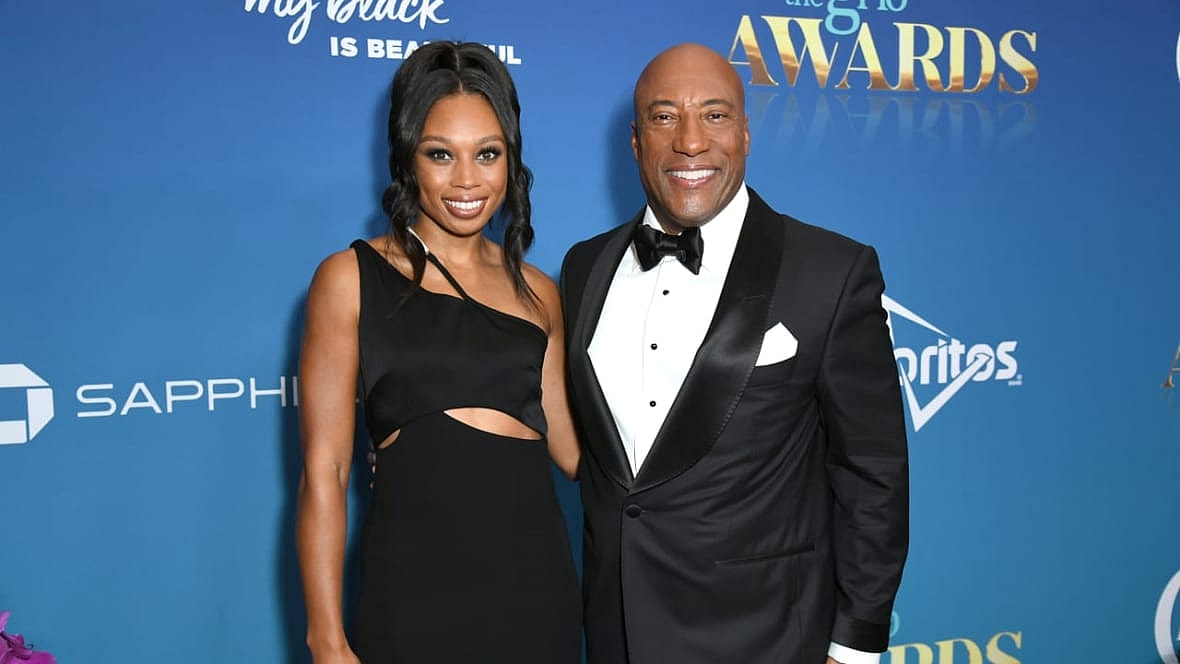Olympic track and field champion and lifestyle brand founder Allyson Felix may have begun her journey to motherhood in the dark, but has not since backed down from shedding light on the struggles of many seeking support while pregnant. Felix recently expressed her thoughts on the matter as an inaugural honoree of theGrio Awards, her words proving particularly poignant as many, galvanized by the overturning of Roe v. Wade, take to the polls on Tuesday to vote in crucial midterm elections that could have a lasting impact on reproductive care and rights.

(Photo by JC Olivera/Getty Images)
While accepting the Sports Icon Award during the first-ever Grio Awards, Felix expressed her shock at being honored, especially after the battle she had to endure while adding motherhood to her many accomplishments. While pregnant, Felix was faced with having to hide the early stages of her condition, developing preeclampsia, losing support from her primary sponsor Nike, and, with a viral op-ed and added advocacy, ultimately compelling the athleticwear giant to change its maternal policies.
“After 14 years of running professional track after going to four Olympic Games, I found myself in a fight with my sponsor for them to change their maternal policies. For all female athletes. For all their female athletes,” Felix told theGrio Awards audience. “I never could have imagined that I would have been there. I was terrified. I was scared. But I knew I was doing the right thing.”
In a pre-show event before the ceremony, Felix spoke with theGrio’s April Ryan about the challenges she’s faced, theorizing about what may have eased her journey.
“I think that things have been a certain way for a really, really long time. And I think that unfortunately, the systems in place were not in such a way that women could speak out; that women could challenge it,” she said. “And I think it took it all coming to a head in using our voice and coming out together and saying that this is not okay. It’s gone on for far too long for things to have to change.”
Felix’s story is not unique. A major factor contributing to whether a person can proceed with a pregnancy is job security, often their only source of health care. According to the Bipartisan Policy Center (BPC), since the Federal Medical Leave Act (FMLA) — which only ensures job protection for unpaid leave — was passed in 2019, eleven states have enacted paid family leave (PFL) programs. Beyond FMLA’s coverage, 17 states have passed laws expanding access to unpaid, job-protected leave.
The BPC also finds that only 20 states, including Puerto Rico and the Virgin Islands, include specific protections for pregnancy-related health complications that may extend a person’s leave.
In Georgia, gubernatorial candidate Stacey Abrams is facing incumbent candidate Brian Kemp for a second time, running on a progressive platform that includes comprehensive reproductive care and abortion.
“My plan will support safe pregnancies, invest in maternal healthcare, fund rural hospitals and recruit and retain physicians statewide — especially in under-served areas and the 82 counties that have no OB-GYN,” Abrams said on her campaign website, adding, “We will also work to repeal Brian Kemp’s extreme and dangerous ban on abortion after six weeks.”
Since the overturning of Roe, 22 states have either passed or proposed legislation that criminalizes abortions, and 36 million people who can become pregnant have lost access to this crucial form of reproductive health care. That means there are thousands faced with having children in a country often hostile to the social, financial, emotional, and health logistics required to successfully raise a child or children.
Five states will directly address abortion on the ballot on Tuesday. California, Michigan, and Vermont voters can choose to protect abortion as a form of reproductive care; meanwhile, Kentucky voters will be faced with banning abortion. Montana voters will be met with determining if medical care providers could be criminally charged for administering abortions.
Regardless of whether abortion is on the ballot, it is on the minds of American voters. According to the Economist’s YouGov America poll, 54 percent of American voters would support adding the right to reproductive freedom — including the right to an abortion — to their state’s constitution, while 49 percent of Americans would oppose an all-out ban on abortion.
Those averages will be a factor as voters in states such as Louisiana, Georgia and Florida vote for governors, legislatures, state attorneys, county executives, and more. Many of those candidates have either promised to uphold or ban abortion protections among other reproductive care measures.
In Louisiana, Katie Darling has been running for the state’s First Congressional District on a pro-choice and pro-family platform.
“We should be putting pregnant women at ease, not putting their lives at risk,” she said in a campaign ad that went viral.
In Felix’s acceptance speech at theGrio Awards, she also shared a nugget of advice with anyone afraid of the daunting task of bringing about change.
“For anyone hearing this tonight, I just want you to know that you can use your voice, even if it shakes,” she said.

Kay Wicker is a lifestyle writer for theGrio covering health, wellness, travel, beauty, fashion, and the myriad ways Black people live and enjoy their lives. She has previously created content for magazines, newspapers, and digital brands.
TheGrio is FREE on your TV via Apple TV, Amazon Fire, Roku, and Android TV. TheGrio’s Black Podcast Network is free too. Download theGrio mobile apps today! Listen to ‘Writing Black’ with Maiysha Kai.

